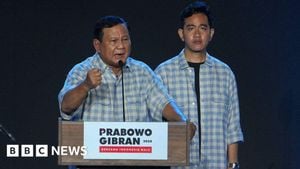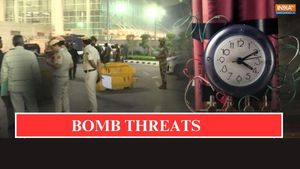Concerns are mounting about the potential involvement of North Korean troops in the Ukraine conflict, as reports have emerged confirming their presence near the Russian border. U.S. Defense Secretary Lloyd Austin has recently highlighted this alarming development, noting during a press conference with South Korean Defense Minister Kim Yong-hyun, "Some advance units have already arrived in the Kursk region, and the likelihood is pretty high" they will see combat.
Officials assert these North Korean troops are not just crossing borders; they appear to be donning Russian military uniforms and equipped with Russian military gear. This collaboration indicates a deepening military alliance between the isolated regime of North Korea and the Kremlin, which has struggled to regain momentum against Ukraine's tenacious defense.
Reports indicate North Korea might deploy as many as 11,000 military personnel to support Russia’s efforts. This partnership could potentially alter the dynamics on the battlefield. Observers argue this kind of military assistance may embolden Russia, leading to escalations and extending the duration of the conflict.
"North Korea’s move to tighten its relationship with Russia has triggered alarms across the globe," Austin stated. The ramifications of this alliance are being closely monitored, particularly as leaders contemplate the extent of Russian military aid to Pyongyang, which may serve as compensation for North Korean support.
Many analysts are expressing concerns about what this could mean for global security. Austin pointed out, "This presence of North Korean troops could broaden or lengthen the conflict," and it raises questions about whether this will influence other nations to escalate their involvement directly. While he acknowledged the possibility of such outcomes, he refrained from detailing specific actions under discussion.
This latest development adds another layer of complexity to the already volatile situation surrounding the Ukraine conflict. Observers are cautioning against underestimations of how shifting alliances could create new challenges, particularly as North Korean troops are known for their commitment to hierarchy and orders, which makes them potentially formidable allies for Russian forces.
The potential mobilization of North Korean troops not only influences military strategy but raises significant geopolitical stakes. With North Korea having heavily invested resources and attention to supporting rogue initiatives, it may be signaling its willingness to engage internationally, albeit through the mediation of Russia.
This situation poses challenging questions for Western nations, which remain committed to supporting Ukraine. The prospect of North Korean involvement could potentially prompt allied nations to reassess their strategies and commitments to ensuring Ukraine’s sovereignty against Russian aggression.
Experts are urging observers to take this potential escalation seriously, as the military confidence gained from North Korea's involvement could inspire Russia to engage even more aggressively. The situation continues to develop, posing risks not only for Ukraine and its allies but for broader global stability.
Given the historical dynamics between North Korea and Russia, particularly during the Cold War, the international community is keeping a watchful eye. Lessons from past alliances suggest enduring consequences could arise from these actions, serving as reminders of how quickly the geopolitical chessboard can change.
International efforts to contain the conflict need to broadcast assurance to Ukraine, so it remains resilient against these varying threats. The narrative surrounding this latest move serves as both a military and political indicator of North Korea's aims and ambitions on the global stage, reflecting its steadfastness toward the international struggles of others.
While the situation continues to evolve, and decisions are yet to be made, the full impact of North Korea's actions alongside Russia could shape the future of military engagements and diplomatic negotiations. Ensuring Ukraine’s safety and security will remain pivotal amid these rising tensions.



